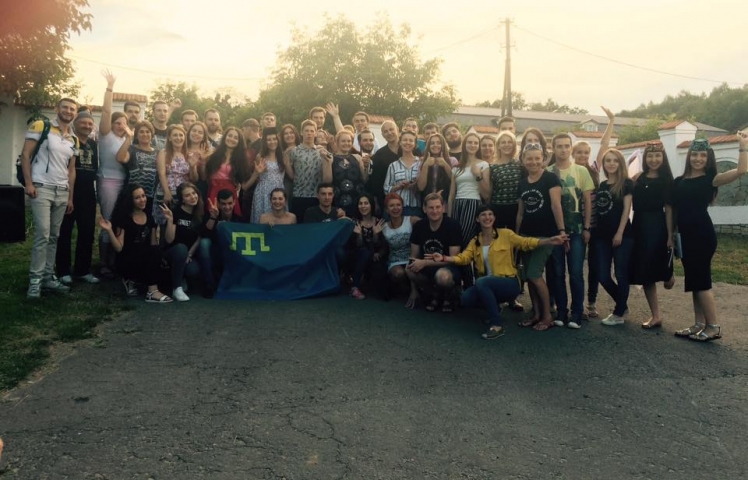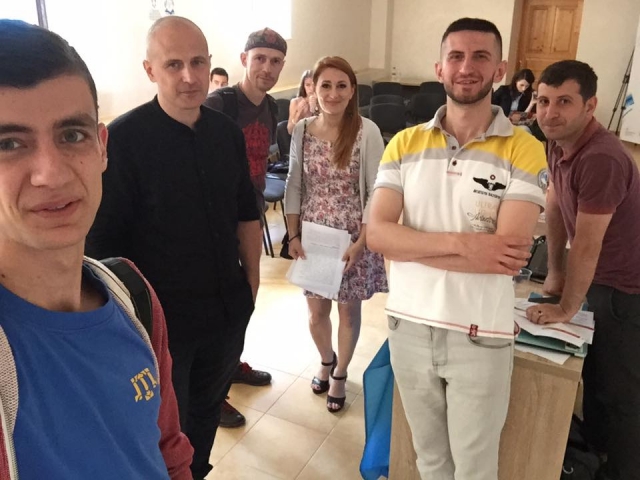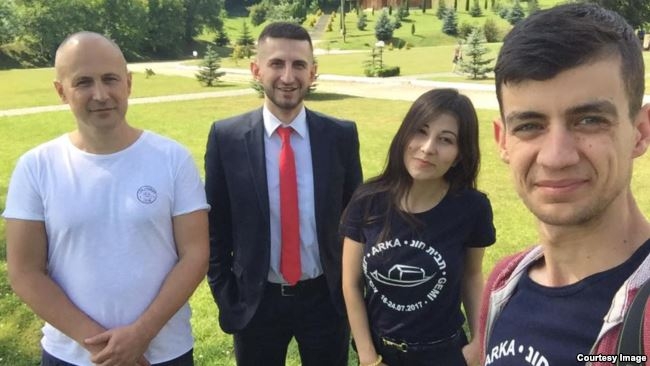It took nearly ten days for interfaith youth seminar “The Arc” at Sviato-Uspenska Univska Lavra (Lviv region) to come to the close.
Traditionally, Consulate General of the Republic of Poland in Lviv, Ukrainian Institute for Holocaust Studies “Tkuma”, Ukrainian Catholic Universitiy, Social Organisation “CrimeaSOS”, and local Hnat Khotkevych Community Centre co-organized the event, while the participants were of Polish, Jewish. Crimean Tatar and Ukrainian origin. The young people were divided in 4 groups, 10 people in each.
During the lectures, integration trainings and discussion the young people learned about culture, traditions and religious beliefs of the ethnic groups represented at the event, and got rid of a number of stereotypes and prejudices against one another through developing direct personal connections. Among the other issues, the participants discussed the nature of different genocides, their common and distinctive traits, and about the tragedies occurring just right now, despite the experience of such tragedies as Holocaust, Holodomor (famine of 1932-33), total deportations of the whole peoples living in Crimea, etc.
They also held the days of ethnic presentations, where each group not only spoke about their customs, traditions, folklore and religion, but also tried to provide stronger cultural immersion, particularly through their cuisine.
As for the lecturers, among them were Gulnara Abdullaieva, a famous Historian and narrator at Crimean Tatar TV Channel ATR (who spoke about the history of Crimean Tatars and origin of Crimean Khanate), Rustem Skibin, a famous artist, ceramist and sculptor (who spoke about Crimean Tatar visual and utility arts and crafts, and about the hidden meanings behind the Crimean Tatar ornaments), Alim Aliiev, co-founder of “CrimeaSOS” and one of the founders of “Krymskii Dim” (“Crimean House”) in Lviv (who spoke about world-famous persons of Crimean Tatar origin), and Khalil Khalilov, Culture Manager, who kept the attention of the audience alive by his tale of Crimean Tatar musical traditions.
They also invited Diliaver Saidakhmetov, a journalist from “Islam in Ukriane” (islam.in.ua), who delivered a speech with an edgy title “Islam: how one can feed three wives”. But why “three”, if it is actually allowed to have four wives at the same time? Because in Ukraine, some people gained their “knowledge” of the structure of a traditional muslim family from a throw-away song “If I were a Sultan” from the old Soviet comedy movie “Kidnapping, Caucasian Style”.
As Mr.Saidakhmetov recalls, he developed an interesting communication experience with his audience. Early that morning he asked every participant to draw their perception of Crimean Tatars, and some of those drawings indeed pushed the polygamy issue. For instance, one of the drawings depicted a man with two wives and two children, while the other participant depicted a mounted man, surrounded by his three wives.
“People prejudge others without even knowing them, based on some gossips. I asked them if they knew at least one Crimean Tatar who had several wives, and the answer was “No”... So I had to tell them some information about both the Islamic rulings on family matters and the Crimean Tatar traditions. First I spoke about the religion, and then discussed the stereotypes about Muslims. In the second block, we dwelled on the five most common myths about the religion of Islam, and I explained that the statement “Islam is the trigger-and-bomb happy religion promoting violence” was wrong, that Muslim women are not oppressed, that the perception of Islam as something far from being spiritual was wrong as well. I told them that the religion just moderated our lives as Muslims. We also spoke about reportedly hatred Muslims feel for non-Muslims, and discussed id the definition of Islam as “the religion of prohibitions impoverishing the lives of Muslims” was even true.”
According to the journalist from “Islam for All” (islam.com.ua), the audience were so carried away by that discussion that they broke every possible time limit, for the lecture had been scheduled to last 45 minutes with another 15 minutes for “questions and answers” session, but the questions and remarks were so many that they had to give them another half an hour. The audience were curious, how and when the Crimean Tatars converted to islam, how widespread was that religion in modern Ukraine, peculiarities of Crimean Tatar mentality and character, Muslims’ attitude to violence, war and aggression, etc.
After the seminar was over, the participants left for Poland.





